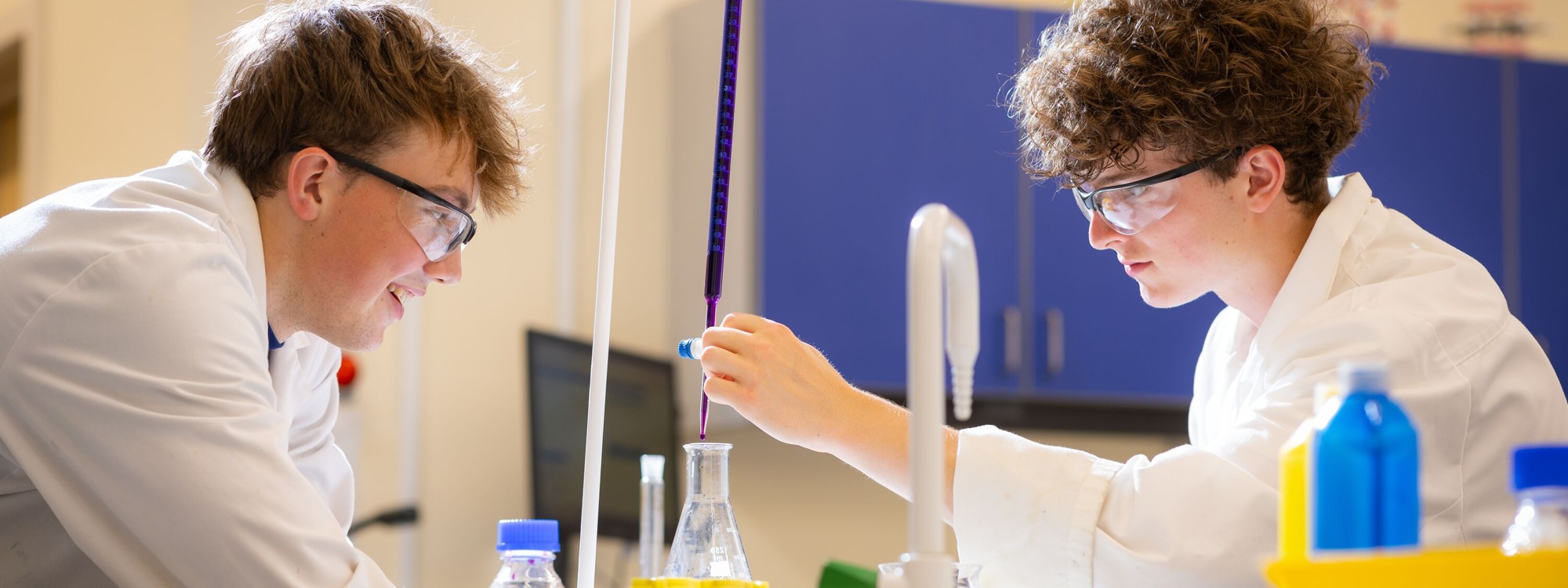- Home
- Curriculum
- A Level Subjects
- Chemistry
Chemistry
Why study Chemistry?
Chemistry is a fascinating subject, and the AQA specification has been designed to inspire students, nurture their passion for chemistry and lay the groundwork for further study in courses such as chemistry, medicine and pharmacy.
Course overview
You will deepen your understanding of how substances interact and why reactions happen. Chemistry will also develop your problem-solving and practical skills.
Overview:
- Core concepts: atomic structure & bonding, energetics and chemical equilibria
- Organic chemistry: carbon based compounds and their reactions
- Physical chemistry: rates, redox and electrochemistry, gas equilibria and thermodynamics
- Inorganic chemistry: the periodic table & transition metals
There are 12 required practicals, assessed over the two years, which will give you an overall pass /fail in your practical endorsement.
How is the course assessed?
A minimum of 20% of the course involves maths skills.
Three written exams
- Paper 1: Physical & Inorganic Chemistry + related practicals.
- Paper 2: Physical & Organic Chemistry + related practicals.
- Paper 3: Synoptic paper covering all content and practicals.
The practical endorsement is a separate pass/fail certificate based on your laboratory skills.
What will I do in lessons?
Lessons will include problem-solving activities, discussions, and working through real-world applications of chemistry to prepare you for exams and further study. You'll carry out practical experiments to apply what you learn, analyse results, and develop essential lab skills.
What Independent study will be expected?
A minimum of 5 hours per week of private study.
You will be set homework, flipped learning, pre-lab work and practice questions.
Exam Board
AQA
GCSE entry requirements:
- 6 in Mathematics required
- 5 English Language required
- 7 + 6 in Science Combined Trilogy required (if Chemistry is the only science subject being studied at A level)
- 7 + 7 in Science Combined Trilogy required (if Chemistry is being studied alongside another A level science subject)
- OR 7 chemistry + 6 biology + 6 physics required
What A Levels go well with this one?
Maths, Biology and Physics are the subjects that will support your Chemistry A level the most.
What can I do beyond A Levels with this subject?
Chemistry, pharmacy, medicine, dentistry, veterinary science, food chemistry, chemical engineering, forensic science, material science, pharmacology, biomedical sciences, biochemistry, to name the most popular. But, as a facilitating subject, chemistry is highly respected by universities and employers.
Frequently asked questions
How big are the classes and how many are there?
There are 11 classes in the year 12 group, with around 22 students in each class.
How much practical work and coursework is there?
Practical work is assessed continually throughout the year and the theory of practical work is included in the exam papers.
There are 12 required practicals - you do 6 in the first year and 6 in the second.
Students are required to keep an up to date lab book to show the development of lab skills.
A certificate of endorsement awarded at the end of the A level course.
How much homework is there?
At least 5 hours work set each week. Teacher feedback is given. Additional work is also expected.
Is there a big jump from GCSE?
Most students find it difficult and there is a big adjustment from GCSE. You have to be prepared to work hard right from the beginning.
Having said that, most students love chemistry and it ends up being their favourite subject.
What do you look for in a student?
High level maths skills - at least 20% of total marks, higher Tier GCSE maths skills).
Good literacy skills – there are some longer answer questions and some of the questions can be tricky to interpret.
Resilience – when things get tough they do not give up.
Hard worker who constantly reflects on how they can improve.
Good organisational skills.
Good practical skills.
What higher education routes does chemistry lead to?
Chemical engineering, medicine, pharmacy, research, dentistry, teaching, chemistry biomedical sciences, etc.
What are the entry requirements to study medicine?
A Levels in Chemistry and Biology - AAA to A*AA (Including a minimum of six 8/9 grades at GCSE).
Should I do A level Chemistry if I don’t like maths?
Overall, at least 20% of the marks in assessments for chemistry will require the use of mathematical skills. These include algebra, graphs, handling data and some geometry.
